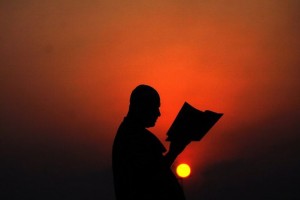 The month of Ramadan has just begun for Muslims, while to a distant observer it may be just about overcoming hunger and thirst, it is actually much more than that.
The month of Ramadan has just begun for Muslims, while to a distant observer it may be just about overcoming hunger and thirst, it is actually much more than that.
Ramadan is a blessed month for Muslims, where they fast from dawn to beginning of sunset. Fasting the month of Ramadan is obligatory for every Muslim adult who is free of any illness. One may be excused of fasting while travelling or pregnant or breast feeding. Fasting Ramadan is one of the five pillars of Islam, the others pillars are: bearing witness that there is no god but Allah and Muhammad is his final messenger, praying five times a day, alms giving and going to Mecca for pilgrimage.
Ramadan is a month where Muslims strive to be closer to Allah; “O you who believe, fasting has been prescribed upon you as it has been prescribed upon those before you, so that you may attain Taqwaa.”(Al-Baqara:183) Taqwa roughly translates as fearfulness; however it refers to a shield or barrier that shields one from disobeying Allah. The more a person has Taqwa, the more their faith is stronger.
Refraining from permitted things like food, drink, and martial sexual relations would make it much easier to avoid matters that are forbidden in Islam. Furthermore, one is only fasting for the sake of Allah.
It is a special form of worship. Anyone can pretend to fast in public while taking a few bites and drinks in private. The virtues and rewards of fasting in Islam are immense. In a divine narration, Allah says: “All deeds are for sons of Adam, except fasting; is for me and I reward for it”
During fasting one should also refrain from anger, backbiting, and any verbal abuse. If one is rude to someone fasting he should not reply with further rudeness, as numerous prophetic narrations indicate. Thus, it is not only physical restraint but also behavioural and moral training. Therefore, fasting helps create self-discipline, self-restraint and strong will. Fasting is a way to learn to control basic human desires and prevent responding to them.
When one experiences hunger and thirst, it gives time to contemplate this feeling. Millions around the world have no choice but to experience this feeling, and unfortunately some, live with it as part of their lives. Fasting not only gives room to appreciate those blessings we deem as a normal part of life, but also hopefully compels us not to forget those less fortunate ones. It is extremely rewarding in Islam to cook for and feed anyone fasting.
Ramadan is a month of forgiveness by Allah. In Ramadan the doors of hell are shut and the doors of heaven are open, and every night there are those whom Allah accepts as being saved from hellfire. Therefore, prophetic narrations indicate that one is truly at loss if the opportunity of Ramadan comes along and it is neglected. Ramadan helps realise that one can change for the better and avoid previous ill ways.
During fasting, one should not stuff themselves with food and sleep all day, probably neglecting most of the prayers as well. It defeats the purpose of fasting. Ramadan should be a month of worship, drawing closer to Allah. During night time, Muslims stand in prayers listening to the Quran being recited. By the end of the month, the entire Quran would have been recited.
Stuffing yourself with food will probably not make the long optional prayers a pleasant task.
Moreover, fasting is good for health as numerous research studies have indicated. Aside from the body using fat reserves; fasting helps detoxify the body, especially: the digestive system, liver and kidneys. Detoxifying allows more efficient digestion and assimilation of nutrients, as well as getting rid of waste. Studies have indicated that during fasting, abnormal tissue like tumours become starved from nutrients and thus become more likely to be broken down. There are many conditions that are alleviated or cured through fasting which include and not limited to; acne, high blood pressures, high cholesterol, hay fever, digestive disorders, asthma, recurrent infections and adult onset diabetes, according to allaboutfasting.com
In Egypt it is quite common to find some non-Muslim foreigners fasting out of religious and cultural solidarity, perhaps some don’t realise the health benefits.
Anyway, Ramadan Mubarak to you all !








